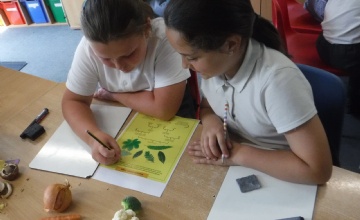Weekly News 27.6.25

We've had another great week in Year 4. We would like to thank everyone that came in for our 'Great Science Share' on Monday. It was great to see the children telling you about their science learning! Here is what we've been up to this week...
English
In English this week we have continued to learn about how to write newspaper reports and recounts. The children have learnt that newspaper reports need to have emotive language that can be used to show a viewpoint. They wrote the main body of their newspaper report using emotive language to show how 'terrible' Roger from our story is (he isn't actually terrible!) The children have learnt that news reports can often be biased towards a certain point of view. In our story, I was a Rat, there was a news report that portrayed the viewpoint that caning children in schools is a good thing. The children rewrote this report, changing the bias of the report to portray a viewpoint that caning is terrible and should be banned. We also found out how to use cause and effect conjunctions in our recounts, such as 'because of this', 'in addition to this' and 'as a result of this'.
Next week we will be learning about how to write a persuasive text.
Maths
In maths this week we have been learning about time. We went over converting units of time using seconds, minutes, hours, days, weeks and months. For example, how many seconds in 6 minutes? If Joe's tortoise is 84 months old, how many years old is he? The children used their understanding of these conversions to solve word problems involving this. We then went on to calculate durations of time such as, how long from 3.30 until 7.15, or if a film starts at 10.15 and finishes at 13.00, how long was the film. The children drew timelines and made jumps of hours, half hours or 15 minutes to work out the amount of time that had passed.
Next week in maths we will be learning about symmetry.
Thematic
This week we have been learning some more about how to classify plants and animals. We found out that animals can be classified as invertebrates or vertebrates. We found out more about invertebrates and the sub-groups they are put in such as crustaceans, insects, arachnids and annelids. We then found out that trees can be evergreen or deciduous, and that plants can be flowering or non-flowering. The children learnt some trees which are evergreen such as pine, yew and elder, and some that are deciduous such as oak, birch, sycamore and horse chestnut. They also named some plants that are non-flowering such as moss, aloe vera and ferns, and some which are flowering such as daffodils, roses, forget-me-nots and lilies. We finished the week finding out about how environments can change for plants and animals. We found about about natural causes of this such as droughts, volcanic eruptions, floods, storms and earthquakes. We also found out about human causes of this such as pollution, deforestation and urbanisation. They wrote incredible reports about this!
Spellings
Mr Oxley's group:
lie tie pie flies cried dried fried cries prove
Challenge words: supplied identified
Mrs Cousins' and Miss Stephen's groups:
various, women, suppose, peculiar, knowledge, medicine, mention, occasionally, possession, different
Dates to remember
1st July – Music evening at 6pm
4th July – Summer fair from 3.30pm
10th July Sports Day – KS2 9.15-12 Reception and KS1 1.30-3
11th July – Reports go out to parents
14th, 15th 16th July – Transition days; children to spend these days with their new class teachers
17th July – Inflatable fun day in school for all children
18th July – School finishes at 2pm for Reception to Year 5
Many thanks
We hope you have a lovely weekend,
Mrs Cousins and Mr Oxley




